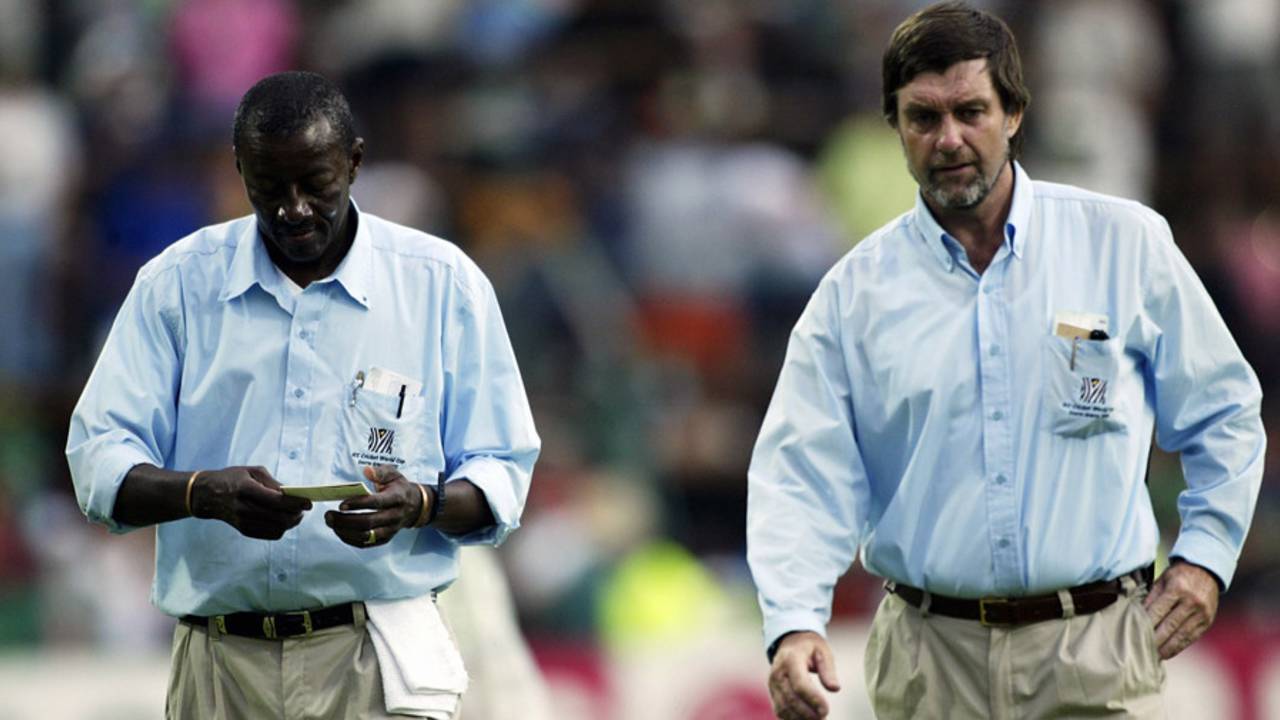Life as an international umpire used to be a lot easier. Turn up early in the morning, try to look interested at the toss, and don't give yourself indigestion by eating too many cakes during the tea break - simple. What's the worst that could happen? Sure, you could make an incorrect decision on the pitch, but at least you had the remainder of the session before you found out television commentators used an eighth slow-motion replay to prove you wrong, prompting effigy burning in India, or a British tabloid to devote their entire back page to a photoshopped image of you being led around by a guide dog.
Okay, perhaps it wasn't quite so easy back then.
But it was a damn sight better than the current situation. Because now we have the DRS. Technology designed to eliminate blatant umpiring mistakes that instead introduces a new layer of decision-making susceptible to human error. It's a system intended to help umpires minimise embarrassment, but one that actually drags out the process of proving them wrong. There you go mate, you just stand in the middle while we show the world and his wife your incompetence from every possible angle, then you can use that new signal to let everyone in the ground know you've messed up.
And there's been a lot of messing up over the last few weeks. From umpires on the field, umpires off the field and a Hot Spot camera that we now know doesn't always detect the thinnest of edges. The DRS system, specifically the way it's being used, is having a shocking Ashes. It's kind of the technological equivalent of Jonny Bairstow. Everything's there for them to be a success, but a combination of bad decision-making and technical errors are gradually eroding your confidence in them both.
The DRS issue might be complicated by the players' clueless use of reviews throughout the current series, but the real problems lie with the system's use by the third umpire. On-field officials have the excuse that their decision has to be made on a single viewing and that the broadcaster's cameras can't replicate their exact viewpoint. But the third umpire sees the same images as the viewer at home, and in the same timeframe. The watching public can measure their judgement against his, and all too often during this series the officials have come up short. The review footage shown
of Usman Khawaja's dismissal during the
Old Trafford Test didn't just reveal a gap between bat and ball, but a gap between the third umpire's opinion and a credible use of the available technology.
Yet I can't see a groundswell of opinion developing to dump the DRS. For a start that would involve everybody who's not the BCCI having to admit that on this issue the Indian board just might have a point. It would also mean technology staying solely in the hands of the broadcasters, and being used to highlight errors to everyone but the officials capable of correcting them. For all the problems being experienced with the DRS, that's got to be a backward step.
Instead the cricket world needs to concentrate on the more fundamental question of the quality of international umpiring. The ICC Elite Panel should contain the best umpires in the world, but in reality its ranks are limited to those willing to make the sacrifices needed to spend large parts of the year taking their suitcase on a grand tour of the world's airports.
The best men available often never officiate at the highest level because the ruling on neutral umpires only offers them the chance to stand in overseas matches, with the accompanying relentless grind of international travel. That's a situation that has to change. We need to revert to having the option of using on-field umpires from the host country; they're the ones most familiar with ground conditions. Neutral officials can, and should, remain as the third umpire and match referee.
Pay the officials better; give them the chance to set a limit on the amount of overseas matches they want to cover, in order to persuade those reluctant to travel. Give promising young umpires the opportunity and financial support needed for them to officiate at first-class level around the world. Recognise that it's just as important for the ICC to invest in its up-and-coming talent as it is for individual boards to send development squads abroad.
We can tweak the DRS as much as we like, but ultimately the final decision is always made by a human. Until we have the best possible officials out in the middle and in the TV umpires' chair, cricket will never get the best use out of the technology available.
Dave Hawksworth has never sat in a press box or charged a match programme to expenses
